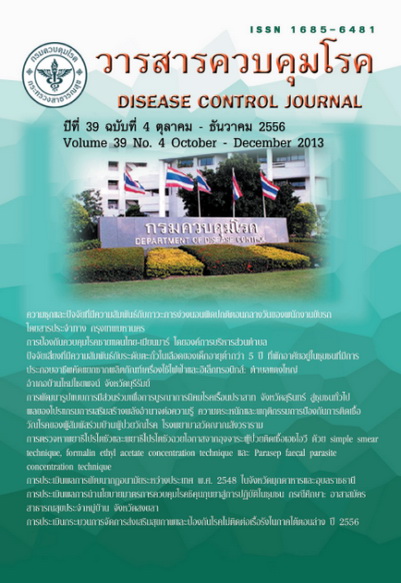Evaluation on the implementation of heath promotion and prevention program on noncommunicable diseases in the southernmost Thailand, 2013
DOI:
https://doi.org/10.14456/dcj.2013.9Keywords:
evaluation, noncommunicable disease control programAbstract
This study aimed to evaluate the implementation of the health promotion and prevention program on noncommunicable disease (NCD) in the southernmost Thailand which was carried out in August 2013. The logic model was applied to analyze about input, process, outputs and outcomes. Using stratified random sampling technique to recruit the study samples to be 2 groups: (1) 140 administrators and responsible officers, and (2) 70 village health volunteers and 210 villagers. Data were collected by using questionnaire, summary chart and reporting forms; analyzed by content analysis, and presented by using descriptive statistics. It was found that the financial supports from multiple sources in each province were used quite efficiently for management and risk communication. At provincial level, the programs were managed mainly by a committee and under responsibility of the officers at provincial level but no responsible persons in community hospitals. Computerized systems were developed for data collection and analysis. The NCD program was performed according to the policy and local public health needs; and was delegated from provincial to community level. As for the outputs, it was shown that the screening for hypertension and diabetes among population over 15 year old and quality of NCD clinic were higher than the targets although risk groups and patients, their blood pressure and blood sugar were not under controlled due to no change in their risk behavior. The village health volunteers could measure the blood pressure and blood sugar test well but did not sure on the interpretation. The study indicated that the implementation of NCD program should be improved especially on case managers in community hospitals, strengthen on changing risk behavior program, and increase capacity of VHVs to serve health promotion and prevention NCD services to people in community.
Downloads
References
2. World Health Organization. Global status report on non communicable disease 2010. Geneva: World Health Organization; 2011 [cited 2012 Jun 5]. Available from*, http://www.who.int/ nmh/publications/ncd_report2010/en/
3. วิชัย เอกพลากร, เยาวรัตน์ ปรปักษ์ยาม, สุรศักดึ๋ ฐานีพานิชสกุล, หทัยชนก พรรคเจริญ, วราภรณ์ เสถียรนพเก้า, กนิษฐา ไทยกล้า. รายงาน การสำรวจสุยภาพประชาชนไทยโดยการสำรวจร่างกาย ครั้งที่ 4 พ.ศ. 2551-52. นนทบุรี: เดอะกราพิโก ซิสเต็ม; 2553.
4. เยาวดี รางชัยกุล วิบูลย์ศรี. การประเมินโครงการ แนวคิดและแนวปฏิบัติ. กรุงเทพมหานคร: สำนักพิมพ์แห่งจุฬาลงกรณ์มหาวิทยาลัย; 2548.
5. สุวิมล ว่องวาณ์ช. การออกแบบและประเมิน โครงการโดยใช้ทฤษฎีการเปลี่ยนแปลง. การวิจัย สังคมศาสตร์. กรุงเทพมหานคร: สมาคมวิจัย ลังคมศาสตร์แห่งประเทศไทย 2552; หน้า 18- 20.
6. ระบบคลังข้อมูลโรคไม่ติดต่อเรั้อรัง [Internet]. [เข้าถึง 10 พฤศจิกายน 2556], สืบค้นจาก http:/ /203.157.229.18/chronic/index.php.
7. หลักการบริหารจัดการ Principle of Management. ภาควิชาการบริหารงานสาธารณสุย คณะ สาธารณสุยศาสตร์ มหาวิทยาลัยมหิดล, 2552 [homepage on the Internet]. [เข้าถึง 11 พฤศจิกายน 2556]. สืบค้นจาก http://phad.ph.mahidol.ac.th/km/ knowledge/ principled 20ofd20management/ index.html.
8. หลักเกณฑและแนวทางการทบทวนแผนพัฒนา จังหวัด/กลุ่มจังหวัด และการจัดทำแผนปฏิบัติ ราชการประจำปีของจังหวัด/กลุ่มจังหวัด ประจำปี งบประมาณ พ.ศ. 2556 [homepage on the Internet]. [เข้าถึง 11 พฤศจิกายน 2556]. สืบค้นจาก http://www.opdc.go.th/content.php? menu_id=5 &content_id=2145.
9. ชุดเครื่องมือการพัฒนาองค้การ (Organization Improvement Toolkits) ตามแนวทางการพัฒนา คุณภาพการบริหารจัดการภาครัฐ. กรุงเทพ-นหานคร: บริษัท วิชั่น พริ้นทั แอนติมเดีย จำกัด, 2551
10. สำนักงานปลัดกระทรวงสาธารณสุข กระทรวง สาธารณสุข. คู่มือรายละเอียดตัวชี้วัดการดำเนิน งานพัฒนา สุขภาพตาม คำรับรองการปฏิบัติราชการ กระทรวงสาธารณสุข ประจำปีงบประมาณ 2556, นนทบุรี: กระทรวงสาธารณสุข; 2536.
Downloads
Published
How to Cite
Issue
Section
License
Articles published in the Disease Control Journal are considered as academic work, research or analysis of the personal opinion of the authors, not the opinion of the Thailand Department of Disease Control or editorial team. The authors must be responsible for their articles.






